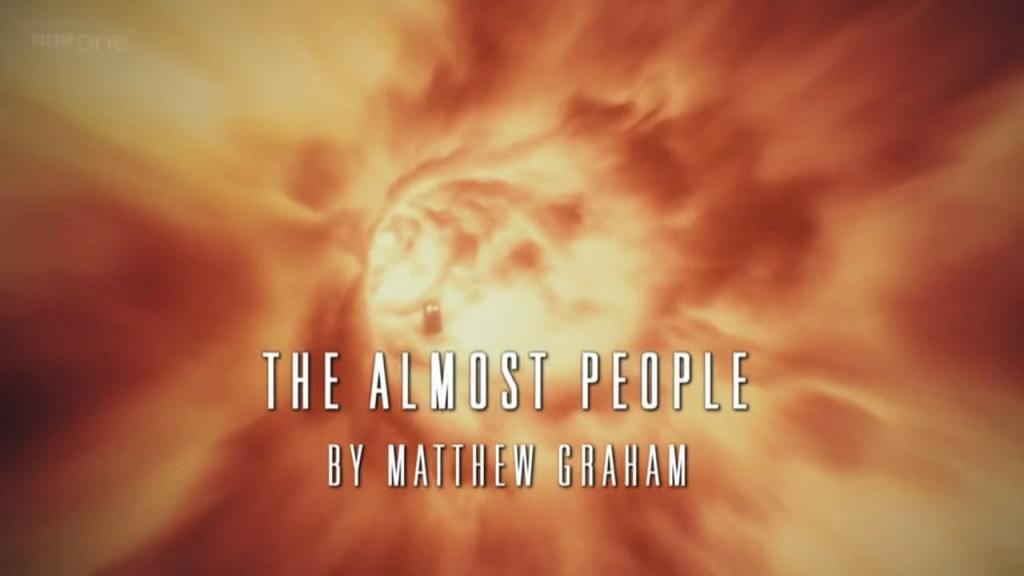
Spike: ‘The Almost People’ ends in a kind of explosive fashion, leading directly into the mid-season finale for Season Six. As such I get the feeling that the general plot points of the episode might get forgotten in lieu of discussing its final moments, which is a shame because ‘The Almost People’ is one of the more satisfying conclusions to a Doctor Who two-parter. A similar thing happened to the Season Three episode ‘Utopia’, which boasted some of RTD’s stronger writing but whose claim to fame was the revival of the Master in its closing minutes. I get the intent of the cliff-hanger, but it does have the unfortunate implication of making both ‘The Rebel Flesh’ and ‘The Almost People’ feel like something of a shaggy dog story.
I found a lot to like in ‘The Almost People’, but the thing I was most impressed by was how the story serviced the meta-plot in a rather subtle way. Sure the discovery of Amy’s abduction and doppelganger is a motivating factor for the mid-season finale, but the episodes also laid the groundwork for the reveal of Amy’s nature. In any other circumstances the revelation that a major character had been cloned or twinned or otherwise replaced for a period of time would essentially torpedo any character development that had taken place. ‘The Rebel Flesh’ and ‘The Almost People’ went out of its way to show the similarity, and ultimate interchangeability, of the ‘gangers and the originals. As such it allowed the revelation of the Amy clone to not significantly damage Amy as a character, but still have her put in danger. As such the real-Amy experienced everything that clone-Amy experienced, with the disparity between them only occurring at the point of the clones destruction.
One of the real joys of the episode was seeing Smith playing off himself, The Doctor and the Cloctor making something of a dynamic duo. It also allowed Smith to broaden his portrayal of the Doctor, adding a touch of fire and threat to his repertoire and continuing the more tricksy characterisation of the previous episode. In fact one of the few disappointments of this episode was perhaps Rory, who found himself oddly side lined for much of the episode and then transformed into something of an oblivious patsy. The classic role of the companion in the old series was to blunder into these kind of mistakes and essentially create obstructions for the Doctor, the new series has generally gone out of its way to avoid that archetype so it was odd to see Rory essentially being an unwitting fly in everyone’s ointment this episode.
I’m sure the gang can’t wait to discuss that cliff-hanger, but let’s talk about the episode in general to start with. So what did you guys think?
Casey: Well that was like Doctor Who by way of some weird Cronenberg/Carpenter mash up. And a creepier episode than anything with the Silents. The little man hasn’t seen it yet, but I expect nightmares and much yelling at me from my wife after he does. Poor British kids, Moffat gives them nightmares and Man U got smacked down on Saturday.
The eyes on the walls and the for lack of a better word glob in the corner are still weirding me out some. The horror of being stuck like that forever. And then The Thing like creature at the end. Really, this was a pretty great horror episode.
The Two Doctors had so much great going for it from the references to old Doctors (which Moffat and company have done a lot of since the start of last season), to the Doctor showing his obvious love for his self to the meta “Call me Smith.” And I am really getting the feeling this season that they are driving the Doctor to a place where he might want to undo the Time War, just so he has someone as smart as him around again. Or this is the reason for his love of River Song – someone he isn’t 10 steps or minutes ahead of.
Smith’s Doctor also continues to bring so much of what I love about him, the righteous scary anger as well as his willingness to hold back because it suits him. The objective first and damn all of you.
As for the ending, well there you go. It was a great catapult into the next one, and I know for many it will overshadow the episode, but I thought it was good serial fiction. Show how what has happened effects the now, will effect the future, and leave us wanting more. Clearly Amy is out of time, and so will her child be. I just hope they can keep the creepiness of the one eyed lady going.
For me though, the biggest cliffhanger is the Doctor now knows or has an idea of his own future.
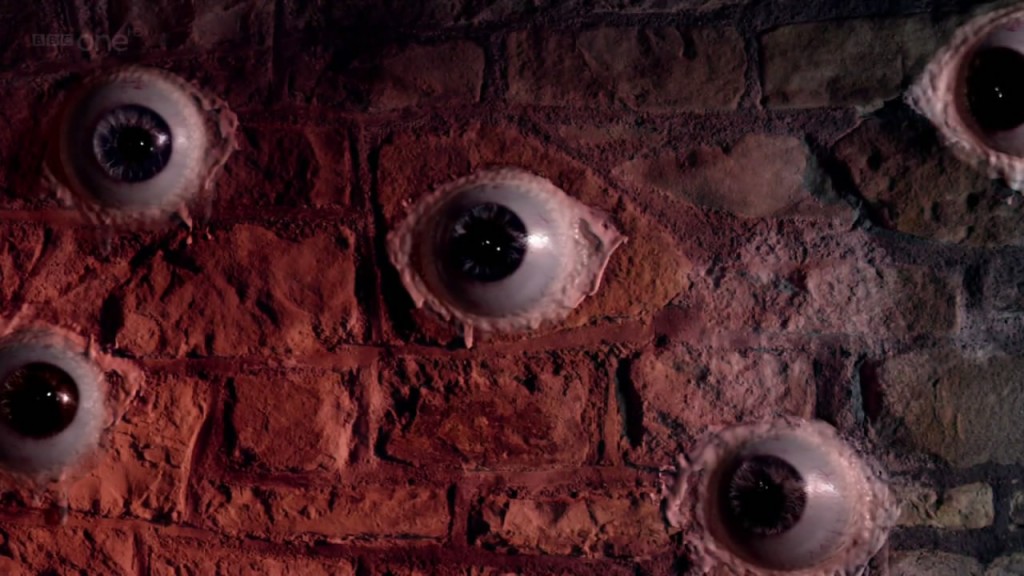
Spike: Yeah, I totally was not expecting Jennifer to go all Silent Hill at the end there. I know that we all recognise the obvious nods to Cronenberg and The Thing but I thought the episode did a fantastic job of being an introductory horror story for kids. In fact I know a few parents who thought the episode went a smidge too far with its horror elements this episode.
Ben: Very solid episode. Pretty good pick-up on last week’s themes, and didn’t end nearly as tidily as I’d feared it might. The character development wasn’t amazing- Rory was, yes, unnecessarily sidelined, and Jenny’s transformation into a monster, while visually effective, felt a little forced on the personality front.
That said, the imagery (gothic castle, twisted monsters and all) really came through, the episode mostly juggled its own moral dilemmas by having some of the ‘gangers take up the human lives, and the pacing didn’t have any of the problems of last week.
Of course, the high point (aside from that ending) was Smith getting the opportunity to really show off, and he carried the two Doctors amazingly well. I guessed the switch pretty early on, but it made it even more impressive to see him manage to pull off real-Doctor-pretending-to-be-ganger-Doctor, and vice versa. Amazingly nuanced stuff, and I was rather sorry to see the second dissolve at the end.
And yes, this was arguably the purest horror stuff we’ve seen on the show in a long time. Moffat’s monsters, while frightening, always had a fairytale quality to them, but the Flesh was pure nightmare fuel, and I’m glad to see I’m not the only one who was getting Videodrome flashbacks from it.
As for that ending? Brilliant. Well foreshadowed, not at all cheap but managing to turn everything on its head. Eyepatch midwife probably managed to become the creepiest thing in the episode.
Kristina: I was a little disappointed as I was watching it the first time, because it felt like the last episode set up things that didn’t quite pay off. The Rory/Jennifer angle, which made Rory look like a boss last week, reduced him back to his bumbling fool status. Was he seriously just going to sit there in that room full of Gangers and let Amy die because The Cloctor shouted at him a little? Come on, man, that’s your wife in there! Where did your balls go? I still didn’t really care about any of the supporting players. The CG on that monster in the climax brought back terrible flashbacks of the atrocious Scorpion King from The Mummy Returns. Having said that, the stuff with the two Doctors was fun to watch, and the ending had me staring slack-jawed at the screen. Never in a million years could I have seen that coming. I’m positive that Moffat is off somewhere cackling like a madman as the Internet Whovian community explodes.
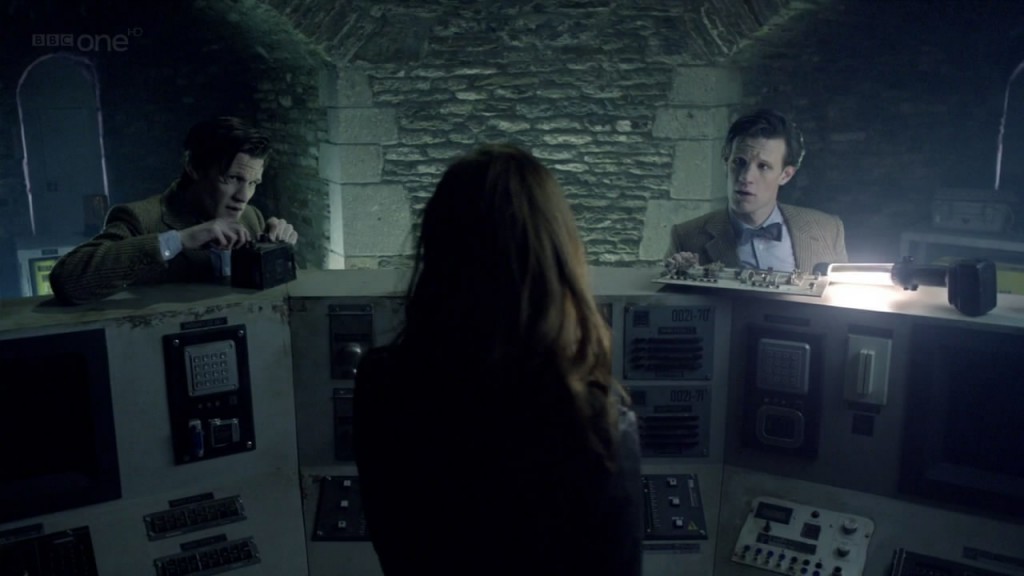
Spike: Whilst the CGI on ‘OMG WHAT THE HELL IS THAT!-Jennifer’ was a little ‘off’ looking I thought the episode used the creature sparingly enough, and obscured it enough, for it to be really effective.
Adam: It was certainly a big step up from the first half. The moralizing was getting pretty heavy-handed and seemed to be pointing towards a “Space Racism is Bad” storyline, as The Onion A.V. Club put it a while back. The trouble with using SF stories as a stand-in for oppressed groups is that it either gets painfully on-the-nose, or the SF aspect is far enough away from reality that it stops being a decent metaphor. (As people have pointed out in the past, it more or less makes sense that people would be afraid of the X-Men, since several of them are powerful enough to commit acts of mass murder with a snap of their fingers. You can’t really relate that to racism or homophobia.) The ‘gangers became less a metaphor and more a SF concept to be dealt with on its own terms in this episode, which is good. (Though I hesitate to bring it up, but if you wanted to you could read an abortion metaphor into all of this, especially given the Doctor’s little speech about “sacred life”…oh man, I probably shouldn’t go there. Never mind.)
At any rate, the fact that we actually had some nuance in the characterization, with good humans and bad Gangers, was nice. If they’d been too committed to “80s cartoon” moralizing we would have gotten mustache-twirling humans and poor, misunderstood ‘gangers. As it were we not only got a range of opinions, we got people changing their minds about stuff. I particularly liked the Doctor accusing Amy of prejudice and her blowing it off, which seemed like Matthew Graham’s way of saying “This isn’t about racism, dammit!” to the audience. I just wish they’d fit that in earlier.
Ian Pratt: As much as this was a marked improvement on last week, it still didn’t do very much for me. It ticked plenty of boxes. The script was stronger, rich with ideas and some wonderful lines; the urgency fit the story without feeling overzealous as some episodes have done in the past; and the atmosphere was suitably foreboding. Despite all that, I didn’t lose myself here the same way I did back on that junkyard planet. There’s no cold, rational explanation for it when there were so many positives (and such a great, dramatic theme at hand.) It’s just didn’t float my boat that much. If it had, I don’t suppose I would have been watching it a second time almost immediately afterward in the hope of seeing what everyone else seemed to in this, to share in the sense of elation and excitement at the big climactic reveal. I enjoyed this episode on a mostly academic level and I’m not saying that to be contrary. It’s actually horrible to feel that way because I was really looking forward to it, especially after reading that Moffat feels this is probably the season’s strongest episode.
If it pleases my team-mates, I’d like to impose a moratorium on references to Saturday’s Champions League debacle. Too soon, Casey. Much, much too soon.
Adam: Yeah, I’m not really sure what Moffat loved so much about this episode, aside from maybe the big ending twist. To be clear, I thought it was a big step up from the first, and a better exploration of the premise, but I’d still put this episode way behind the Gaiman episode and the opening two-parter.
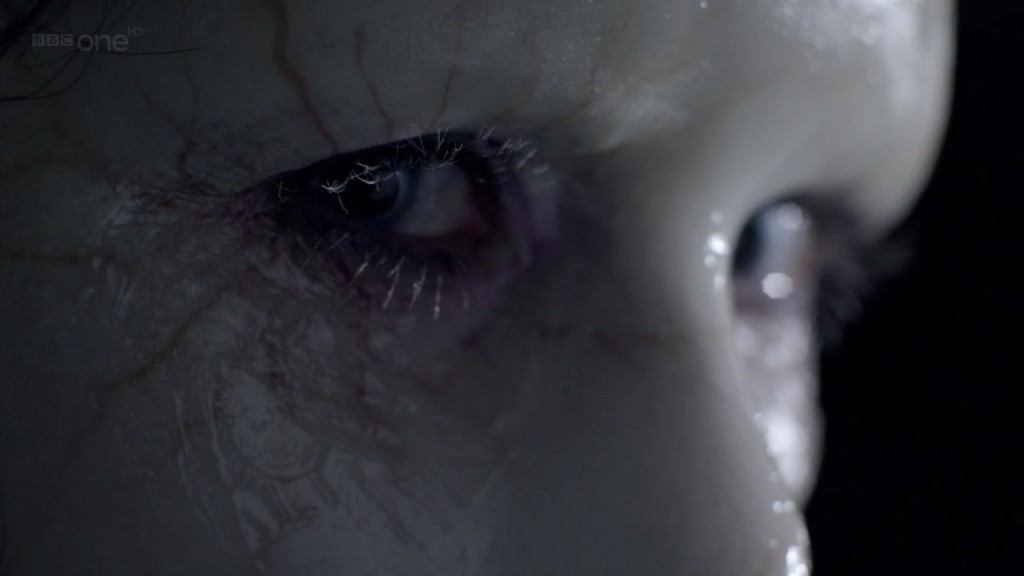
Ben: Thirded. Strong episode, and Moffat couldn’t exactly pick his own episodes, but I’d take Gaiman’s over this any day. It’s a long, long way ahead of the pirates, though.
Just a side thought, but we’ve actually seen very few original monsters so far this season, compared to previous ones- The Silent and the Flesh are pretty much it, as I’m not sure the Siren qualifies. Would that be a budget casualty, or just a side-effect of so many two-parters and running plots?
Spike: Moffat is nothing, if not a salesman.
Adam: Speaking of ‘Utopia’, as Spike did at the start, I’m quite happy to see Moffat playing around with the structure of the season. During Nine and Ten’s run, things got codified to the point of formula: you’d have the premiere, an episode set in a dystopian future (usually the second episode of the season), a Dalek appearance, an episode featuring a historical personage, a two parter by the showrunner, another two parter by someone else, an episode where the Doctor made only a fleeting appearance due to scheduling concerns, and then the two-part finale, usually involving Daleks and Earth being threatened by invasion or destruction. ‘Utopia’, being the first part of a three-parter, was the only episode I can think of that broke that structure, and that only a little.
Last season stuck to that formula to a T, to the point where I was actually a little concerned that Moffat was just going to rehash what Davies had done. But so far this season has thrown caution to the wind and shaken things up nicely. With this episode ending with a “to be continued”, it sets up much more of a true ongoing storyline than we’ve seen on this show before (since apparently the next episode’s going to have a cliffhanger as well, then the agonizing months-long wait…) Given that the Silence are almost guaranteed to return (and it seems pretty likely that the Cloctor will as well, given the heavy-handed foreshadowing right before he melted), that means that of the seven episodes in this mini-season, all but two have been part of a meta-narrative. Yet they’ve done a nice job of keeping the individual episodes as standalone stories.
Ben: In some ways I’m actually a little sorry to see the number of standalone episodes drop, as those have always been one of the show’s strengths, especially when the running plots were as poorly-resolved as they were during the first few years. Having almost every episode play into a running storyline is something that’s only been done a few times in the show’s history, and I’d hate it to become the model from now on, as it’s likely to alienate a good part of the more casual/younger audience.
That said, Moffat has been balancing things far better than he might have done, and the plot we’re getting out of it is fascinating. There are an awful lot of spinning plates here (Why did the TARDIS explode last year, and why on the day of Amy’s wedding? What made Amy so significant in the first place even before this pregnancy storyline? Is the little girl a Time Lord? A TARDIS core? How did one of the Silent’s pseudo-TARDISes wind up in The Lodger? etc.), but I’ve got reasonable faith in the man’s ability to tie them all together somehow.
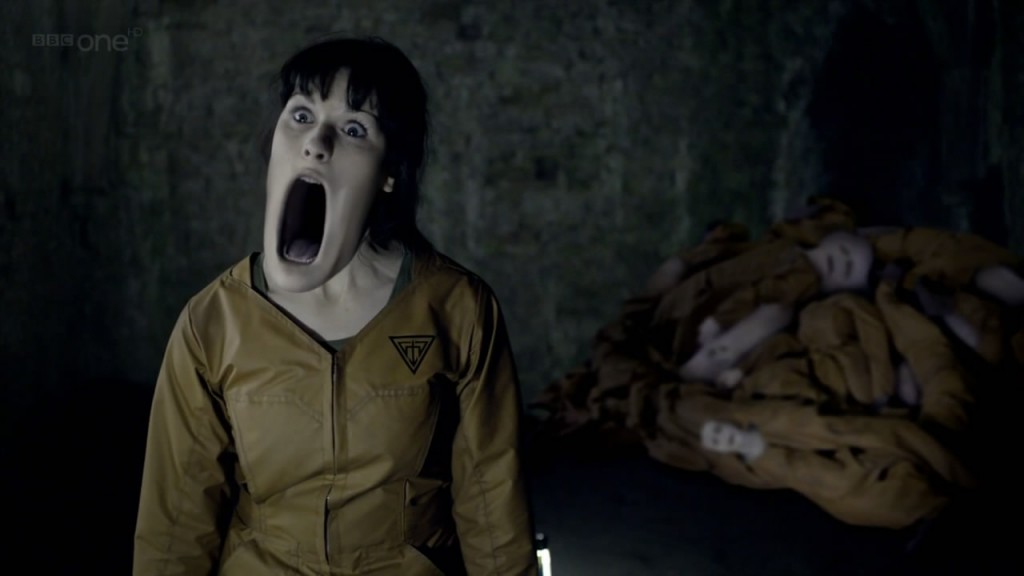
Adam: I would actually sort of agree–if you remember, I had a big rant about Doctor Who being one of the only SF shows that did solid standalones these days–but I think the show needed a shakeup, and like I say, the show hasn’t become TOO serialized. It’s more modular, with one adventure leading into the next, as opposed to the whole season being one long adventure. Being a time-travel show helps there too.
Kristina: I wanted to ask if I was the only one who felt that the “Amy is a BIGOT!” angle just did not work. I felt that everything she said and did was justified. One of The Doctors was there first, so of course she is bound to feel more of an attachment to him than the other one. And for Pete’s sake, what did The Doctor expect her to do after he slammed her against that wall, hurt her, and scared the crap out of her? Smile and give a sermon on tolerance?! I would have been repulsed, too. Maybe that makes me an interstellar bigot, but I didn’t see Amy being as mean as some other folks have. The reveal of the swapped shoes was a nice moment, and Amy’s line about The Doctor being “twice the man I thought you were” was even better, but it would have had more of an impact to me if her behaviour toward The Doctor’s Ganger had been irrationally harsh.
Spike: I think the stuff with the Doctor and the Cloctor was almost a way of testing Amy, seeing how she was going to react to the revelation that she herself was a ‘ganger, or at least that’s how I perceived it.
Got to agree with the point Adam made about the structure of the season, I’ve really enjoyed how they’ve structured this micro-season, layering its main thematics and ideas into almost every episode and building up to ‘A Good Man Goes To War’. I think one of the main failures of the past seasons of Doctor Who was that the main writers got too enamoured with their overarching storylines and as such it often felt like the entire season was just making time for the big finale. I think Moffat has thus far done a great job of making every episode feel part of a bigger overall structure and I think it’s because he’s put his mysteries at the forefront of the episode rather than hiding them in ‘Bad Wolf’ style memery.
Casey: Something to the ending, maybe this leads to a better relationship in a way for both Amy and Rory. Both now have the shared experience of being not truly human. And in a way, I think that was why Rory was able to stand back; I think he knew at the moment what the Doctor knew.
Also, I didn’t see this as the Doctor trying to show Amy as a bigot, but rather the Doctor trying to show her the Cloctor is just as real as he is, so maybe when they do find her she will understand her memories and experiences are just as real as if she had been physically present.
By the way, I am happy we got to see some more of Smith as Angry, Dark Doctor (as well as Manipulative Bastard Doctor). One of his standout scenes to me is still him shouting “NO ONE HUMAN TALKS TO ME TODAY!”
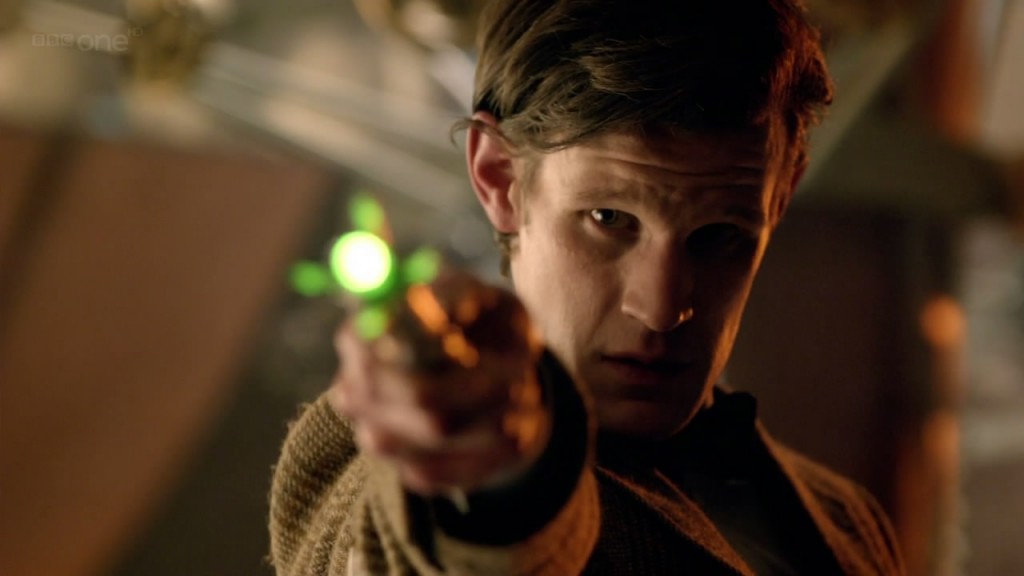
Kristina: I’ve got no problem with him getting verbally nasty, but that moment where he slammed Amy into the wall made me very uncomfortable after I realized that it wasn’t The Cloctor having a Flesh-related meltdown, but The Doctor doing…what, exactly? What was the purpose of that? I get him being upset because Amy had just revealed to him that she saw him die, but slamming a woman into a wall and not letting go after she clearly says “You’re hurting me!” is always going to rouse my ire.
I’m grateful that he apologized afterwards, but that was just uncalled for. But, playing devil’s advocate, if he always did exactly what was called for, then he wouldn’t be a character worth watching.
Ben: Yes, part of what’s made Matt Smith’s take on the role so compelling for me is that he does actually come across as credibly alien, and not completely safe. He plays the dark edge to the character at least as well as Eccleston did, but without letting it be nearly as much of a defining trait.
Make the Doctor kind and patient and perfect all the time and you wind up with Ten.
Spike: The Doctor’s always had shadings of darkness to him (the First Doctor attempted to brain to death a wounded caveman in his first adventure because he was slowing the group down), but I think Smith’s done a lot to internalise that darkness. I don’t really think he’s a dark character, I just think that Smith (like Ben mentioned) made the decision to play The Doctor far more alien than Tennant.
I do have to wonder about that scene between The Doctor and Amy in the corridor though. When The Doctor grabs Amy and pushes her against the wall he’s feeding back the memories of the Flesh, like Jennifer did, but I don’t get how that is actually possible if that is actually the Doctor (as revealed at the end) and not the Cloctor.
Adam: Wait, isn’t Ten the Doctor who threatened to set himself up as God-Emperor of the Universe because he was the only Time Lord? I’m not sure there was anything kinder about him except the fact that he had those big, dreamy eyes.
Spike: He did feel really bad about trying to become God-Emperor of the Universe though.
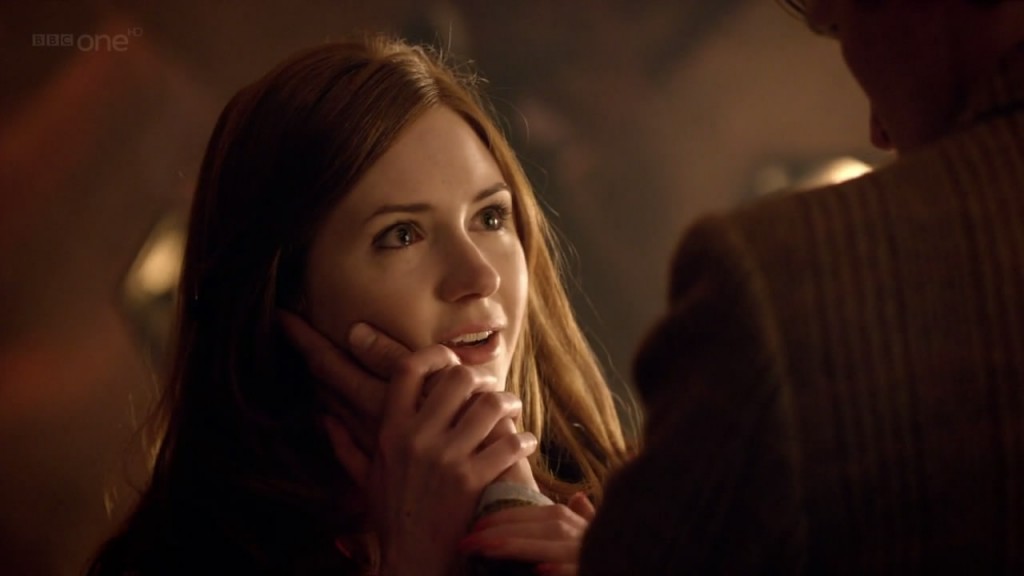
Adam: Yeah, that’s the Doctor for you. He comes on as pleasant (usually, unless he’s One or Six), then ends up committing atrocities, then feels really bad about it.
Spike: Well he either feels really bad about things or leaves his one true love with an emotionally shattered and genocidal clone version of himself. It’s an either/or sort of proposition.
Speaking of clone versions of people, what did we all make of those last five minutes?
Adam: Well…at this point the obvious solution is that the girl in the astronaut costume is Amy’s child, grown up, and she’s special because she’s been in the TARDIS and was probably exposed to some kind of special radiation (hence the “time head” discussion in ‘Day of the Moon’). I actually wouldn’t be surprised if she was conceived in the TARDIS, on Amy and Rory’s honeymoon (which would actually give us an excuse to flash back to that) (um, I don’t mean the actual conception, just the honeymoon in general).
I’ve heard people suggest that Amy was swapped out as far back as right after her first meeting with the Doctor as a child (!) but that’s a) kind of horrific and b) undermines a lot of the first season. I think the kidnapping goes back to her first glimpse of the Sliding Panel Eyepatch Lady–it either took place before the beginning of the current season, sometime after ‘A Christmas Carol’, or during the three skipped months of ‘Day of the Moon’. Which is actually funny because that means the Silence kidnapped a duplicate Amy. Again, I wouldn’t be surprised if this revelation gives us an opportunity to flash back to those missing months.
Spike: I keep thinking about Idris’s last line “The only water in the forest is a river”. Considering we have Amy Pond and River Song, and they were both in the artificial forest in the Angel two-parter, might it suggest Amy hasn’t been Amy since then?
Ben: It’s been suggested that eye-patch lady is River Song, though make of that what you will.
On a more serious point, I’m pretty sure the little girl is a TARDIS soul (like Idris), not a Time Lord, given that the Silent have been trying to build a TARDIS all along. I think the kidnapping will have taken place between ‘The Impossible Astronaut’ and ‘Day of the Moon’, given how sure Amy was that she was pregnant before then. How involved the Silence are with it I’m not quite sure- them kidnapping a duplicate does seem kind of silly, but given when Amy first saw the creepy midwife it’s hard to see how it could work otherwise, which makes it far more likely they thought they had a real Amy but didn’t.
Spike: I am of opinion that the Silence are in no way connected with eye-patch lady. I actually think that they somehow messed up the signal between Amy and ‘ganger-Amy during their initial encounter which is why Amy had that bizarre “I’m Pregnant” moment at the end of ‘The Impossible Astronaut’.
Adam: But the Silence are interested in Amy’s child, remember? “She will bring the Silence” or whatever? I don’t think it’s a coincidence, and even if eye patch lady isn’t directly connected to the Silence, she’s one of several factions who want to get hold of Amy Jr., so she’s tied up with them in that sense.
Spike: I think the Silence recognise Amy as being important, but I don’t think they’re the ones responsible for the kid. Ben said a few weeks back that he viewed the Silence and the ‘Silence Will Fall’ as two separate things. One was a race of creatures, the other a kind of prophecy. It’s impossible to tell at this point, but the trailer seems to show no real indication that the Silence are involved next week. This is odd because they were set-up as a fairly major antagonist at the start of the season.
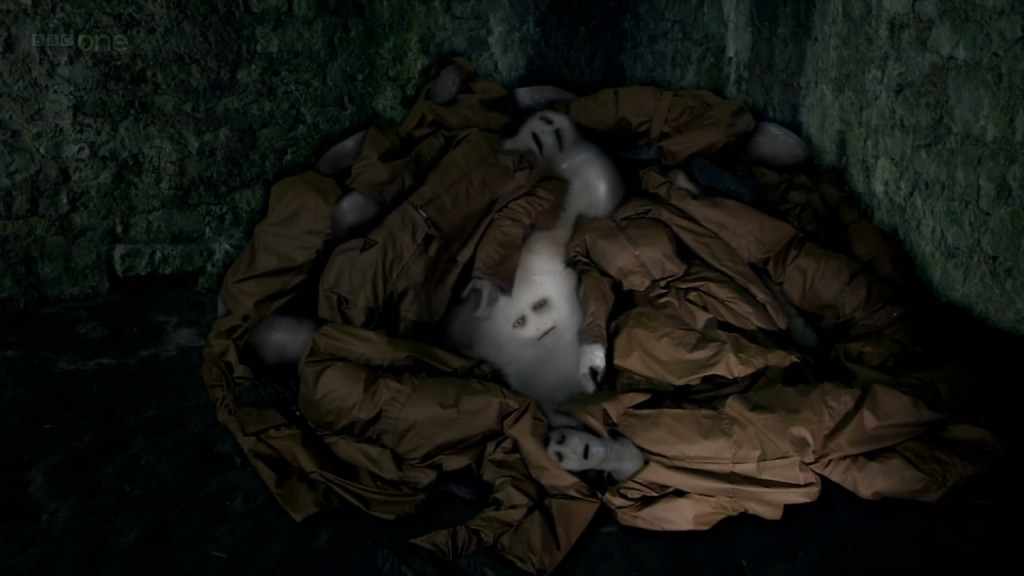
Adam: Well, they might not want to reveal that in the trailers. And I’m not saying the Silence are responsible for the kid–I think Amy got pregnant the usual way–but they’re involved in her kidnapping somehow. I guess we’ll see. Anyway, I’ll shut up; any other folks want to weigh in?
Ian: The last five minutes were undeniably well executed, but the impact of the twist was dulled for me by the two episodes that led up to it. I was too disengaged from the drama to feel the intrigue and wonder that’s evident in this discussion. I’ll be honest, I’ve not really thrilled to the multi-layered approach going on here as much as the rest of you. Over the first few weeks, when the picture was yet to take on any real shape, I accepted it as part of the new season launching; it’s still hitting its stride – that kind of thing. I loved the previous series so much that it was always going to take a bit of time for this one to win me over. But the more it’s unfolded, the more I’ve realized I’m enjoying that “multi-tasking” aspect the least out of all of us. Payoffs aren’t feeling particularly “earned” to me because so much is in flux. This is just a purely personal preference, but I like greater diversity with the pacing of my TV shows. I like to have a very fixed sense of what’s what. That way, it’s all the more potent when the lay of the land is suddenly changed in some way or there’s an immediate surge in action/peril.
I haven’t found that to be the case here so far though. When the rug has been pulled out from under, it’s felt more like an irritation than a magic trick. It’s not that I don’t appreciate this kind of storytelling or the ambition behind it. It just hasn’t hooked me the way I can tell it’s meant to. The mostly airy action/adventure tone of the show might be a big reason behind this. It could just be that the structure isn’t sitting too well with this kind of family institution for me. Maybe that’s partly due to my relative inexperience with the show, or maybe I just really prefer Doctor Who when its episodes are self-contained.
Spike: I can certainly understand where you’re coming from Ian, and I’m of the opinion that Doctor Who often works better as a singular standalone episodes rather than a longer, serialised arc. I’ve just been impressed by how deftly Moffat was able to interweave his singular stories into his grander vision last season, and I’m hoping he does the same this year.
Ben: Again on the Silence and “silence will fall” not being one and the same- the voice heard in the TARDIS during ‘Pandorica Opens’ was nothing like them, and nor is hijacking a TARDIS. Also, why did the Silence want Amy to tell the Doctor she was pregnant? I’m honestly baffled as to where that fits into anything, and it certainly suggests they’re not the ones secretly abducting real, pregnant Amy.

Spike: That’s what I was trying to get at, in a roundabout way. I think the Silence were being opportunistic in ‘Day of the Moon’, working off of someone elses plan.
Even with all of these questions the season finale looks absolutely mental. There’s an official BBC1 trailer below for the episode and you can see for yourself that it looks ‘big’ in every sense of the word. Space Nazis, Cybermen, Eye-Patch Lady, Roman-Rory, asteroid bases, River-Song, smack-talk over TV monitors.
All the classic hallmarks of awesome Doctor Who.